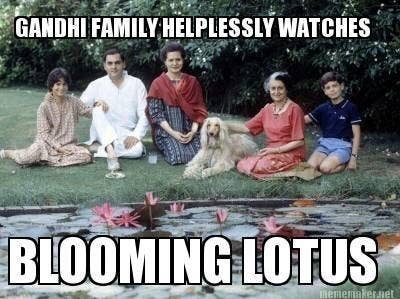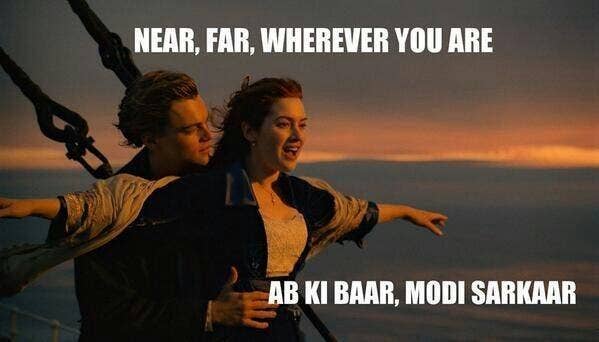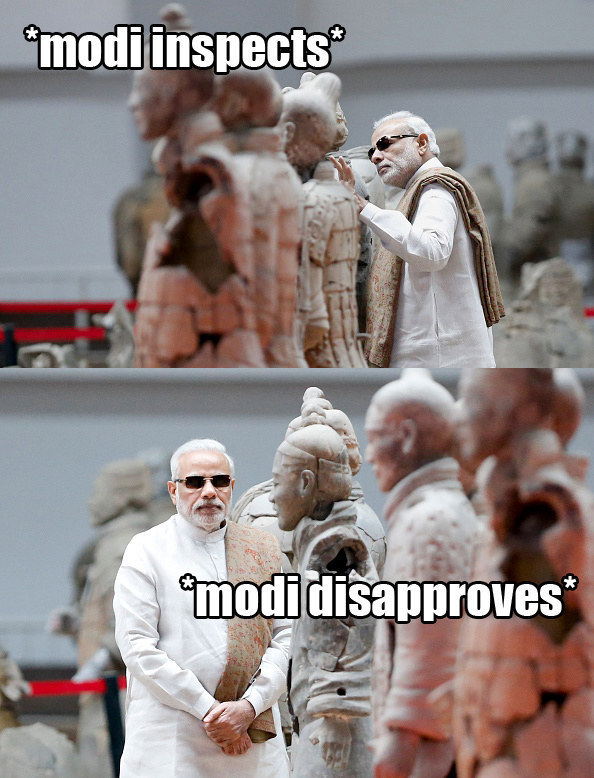A year ago, the world watched on in awe as a former chaiwala won history's largest democratic election with a staggeringly huge margin of victory.

And, in the year since, India's incorrigibly creative netizens have documented his every move via one globally transcendent language...

Memes.

It all began with a brilliantly rhyme-able campaign slogan that, in an instant, took over all our timelines.

It continued through election night as the numbers rose to unprecedented heights in his favour. The day after, memes were used as burn-weapons against his defeated adversaries.

In the year since, Narendra ji has provided ample fodder for our daily online LOL-fests, ranging from high profile meetings with Bollywood's best to visits from dignitaries and heavily documented trips to every corner of the globe. He has donned an impressively vast array of Photoshop-friendly headgear, he has played instruments and sports, he has taken selfies and struck thousands of poses which lend themselves almost too easily to well-meaning ridicule. And the internet, each and every time, has played the fool with gusto.
"Modi" has been part of an all-India Twitter trending topic about once every other week since he assumed office, and even a few worldwide. He is quite possibly the single most meme-able, GIF-able, retweet-able thing to happen to the Indian internet. By both accident and design, his ascendance to power has coincided with India's mass embrace of the world wide web. The resulting cacophony has been incredibly fun to witness and wade in.
This graph of how often the word "memes" has been searched in India over time spikes tellingly in the months surrounding Modi's election:

But Modi's unrelenting grasp on the internet's otherwise pitiful attention span didn't spontaneously invent itself in a vacuum. Rather, like almost any cultural phenomenon, it arose as a reaction to the exact opposite. In this case, silliness and goofiness and irreverence were bred as a response to fear.
Exactly a year ago, two stories found parallel virality: one was about Devu Chodankar, a Goan man who posted a Facebook status critical of Modi's politics and faced a subsequent police case for it. The second story was of a 24-year-old Bangalore student who, along with his roommates, was taken into custody after police found an "objectionable" WhatsApp message sent from his phone. That condemning WhatsApp was also critical of the prime minister.
Both these free speech horror stories occurred and found large-scale online traction in the last week of May, 2014 – the same week that Modi won history's largest election and became an instantly iconic rags-to-riches poster-boy for desi democracy. Briefly, in their aftermath, these stories enforced a chilling second thought on anybody who maintained an innocence about the internet being a safe space for dissent.

The year since has not been favourable to freedom of expression in India. Ranging from bans on 50 Shades Of Grey and India's Daughter to a merciless takedown of All India Bakchod's roast of Bollywood stars, Indian citizens, courts, and censors have all waged violent wars against any content contrary to the purest, most flattering narratives of what "India" is and appears to be. Too many new words – beef, Bombay, lesbian – have been made taboo this past year, and bans have been imposed with unprecedented recklessness.
As a result, it is not only more fun to make the jokes that feel forbidden, it is also "irreverent" and "edgy" to make any jokes at all. The circumstances, in short, are riper than ever for a nationwide embrace of mockery, of comedy, and of memery.
While, on the one hand, the internet has made it tragically easy to see India's moat-like faultlines (just run a Twitter search for "libtard" or "AAPtard" or "sickular" if you don't know what I'm talking about), it has also united both sides of the aisle over an insistence to take to Twitter and Facebook as spaces where the natural response to outrage is L-O-Ls.
Exactly two months ago, India's Supreme Court struck down what was the greatest threat to this vibrant and hilarious internet culture: section 66A. The now defunct Penal Code section ruled that anyone could be arrested for posting "offensive" content online. It was introduced in 2009 and, since its introduction, it was used to arrest several Indians whose only crimes were posting Facebook statuses (or, in some cases, simply "liking" them), drawing cartoons, making jokes about politicians, and so on. Aside from his own adorable love for Twitter, Facebook, and Instagram (and even Dubsmash), that this law was struck down under Modi's sarkar is reason to believe that our prime minister adores the internet almost as much as the internet adores him.
While the last two weeks have seen him come under fire for his work (or, some will argue, the lack thereof) in his now complete first year in office, one victory nobody can take away from Prime Minister Modi is that regardless of whether you love him or hate him, if you are on the internet – and let's remember that over 300 million Indians are – you absolutely cannot ignore him.
